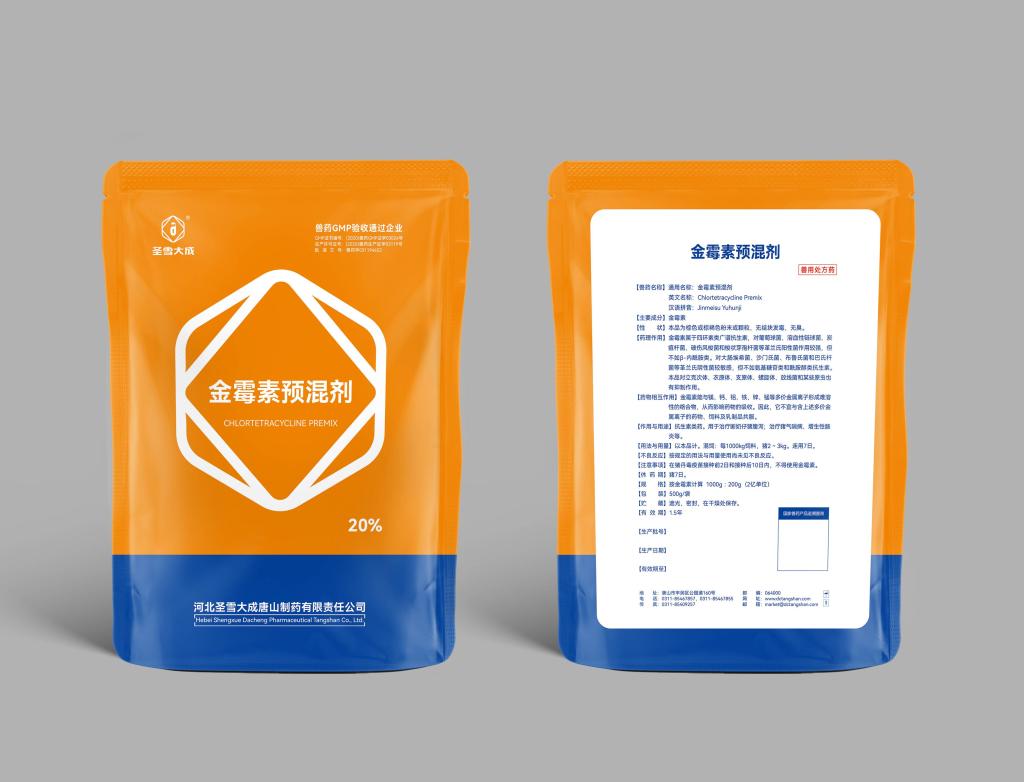Tel:+8618231198596

News
 CONTACT
CONTACT
 CONTACT
CONTACT
- Linkman:Linda Yao
- Tel: +8618231198596
- Email:linda.yao@dcpharma.cn
- Linkman:CHARLES.WANG
- Department:Overseas
- Tel: 0086 0311-85537378 0086 0311-85539701
News
Investigating the role of Chlortetracycline Premix.
TIME:2024-06-21
Introduction to Chlortetracycline Premix
Chlortetracycline (CTC) is a broad-spectrum antibiotic belonging to the tetracycline class, used primarily in veterinary medicine for its antimicrobial properties. As a premix, CTC is formulated for administration in animal feed, facilitating controlled dosage and distribution among livestock and poultry. Its efficacy against a range of bacterial pathogens makes it a valuable tool in disease prevention and control on farms.
Mechanisms of Action
Chlortetracycline exerts antimicrobial effects through several mechanisms:
Inhibition of Protein Synthesis: CTC binds to the bacterial ribosome, preventing the attachment of aminoacyl-tRNA molecules and inhibiting protein synthesis crucial for bacterial growth.
Bacteriostatic Activity: By interfering with bacterial protein synthesis, CTC exhibits bacteriostatic properties, slowing the growth and reproduction of susceptible bacterial species.
Broad Spectrum: CTC is effective against both Gram-positive and Gram-negative bacteria, including respiratory and enteric pathogens commonly found in livestock and poultry.
Effectiveness in Disease Prevention and Treatment
1. Control of Respiratory Diseases:
CTC is widely used to prevent and treat respiratory infections in poultry and swine, including diseases caused by Mycoplasma spp., Pasteurella spp., and Actinobacillus spp. Its inclusion in feed formulations helps maintain respiratory health and minimize disease transmission within flocks and herds.
2. Management of Enteric Infections:
In livestock, CTC is effective against enteric pathogens such as Escherichia coli, Salmonella spp., and Campylobacter spp. It reduces intestinal colonization and mitigates the risk of diarrheal diseases, improving gastrointestinal health and nutrient absorption in animals.
3. Control of Chronic Infections:
CTC is utilized in the management of chronic infections in livestock, such as arthritis in poultry and respiratory infections in cattle. Its prolonged administration helps suppress bacterial growth and alleviate disease symptoms, enhancing animal welfare and productivity.
Economic Implications for Farmers
The use of chlortetracycline premix in disease management has economic implications for farmers:
Improved Animal Health: Effective disease control with CTC contributes to improved overall animal health and reduced morbidity rates, minimizing veterinary interventions and associated costs.
Enhanced Productivity: Healthy livestock and poultry exhibit improved growth rates, feed conversion efficiency, and reproductive performance, translating into higher yields and profitability for farmers.
Cost Savings: Proactive use of CTC as a preventive measure reduces the incidence of disease outbreaks, preventing potential losses from mortality, reduced production, and treatment expenses.
Regulatory Considerations
Regulatory authorities oversee the use of chlortetracycline premix in animal agriculture to ensure safety and efficacy:
Approved Uses: CTC is approved for specific indications and species, with guidelines on dosage, withdrawal periods, and maximum residue limits in food products.
Antimicrobial Stewardship: Regulatory agencies promote responsible use practices to mitigate antimicrobial resistance, emphasizing prudent use, proper administration, and adherence to veterinary prescriptions.
Monitoring and Surveillance: Continuous monitoring of antimicrobial residues and resistance patterns in livestock and food products ensures compliance with regulatory standards and public health safety.
Challenges and Future Directions
Despite its benefits, the use of chlortetracycline premix in agriculture faces challenges:
Antimicrobial Resistance: Concerns over the development of antimicrobial resistance necessitate ongoing surveillance, research into alternative therapies, and stewardship practices to preserve efficacy.
Consumer Awareness: Increasing consumer demand for antibiotic-free products encourages the development of sustainable farming practices and alternative disease management strategies.
Regulatory Evolution: Adaptation to evolving regulatory requirements and international standards governing antimicrobial use in food production systems.
Future Prospects and Sustainable Practices
Future directions in the use of chlortetracycline premix aim to promote sustainable farming practices:
Alternative Therapies: Research into novel antimicrobial agents, probiotics, and vaccines as alternatives to reduce reliance on antibiotics while maintaining animal health and welfare.
Precision Agriculture: Adoption of precision farming technologies to optimize disease management strategies, improve biosecurity measures, and minimize environmental impact.
Education and Collaboration: Stakeholder collaboration among farmers, veterinarians, researchers, and regulatory agencies to foster responsible antimicrobial use and promote transparency in agricultural practices.
Conclusion
Chlortetracycline premix plays a vital role in mitigating the impact of disease outbreaks on farm profitability through effective disease prevention and treatment in livestock and poultry. Its antimicrobial properties, broad-spectrum activity, and established efficacy support its integral position in modern agricultural practices. As the agricultural sector navigates challenges related to antimicrobial resistance and regulatory scrutiny, the responsible use of chlortetracycline premix remains essential for ensuring animal health, food safety, and sustainable farming practices.
- Tel:+8618231198596
- Whatsapp:18231198596
- Chat With Skype







